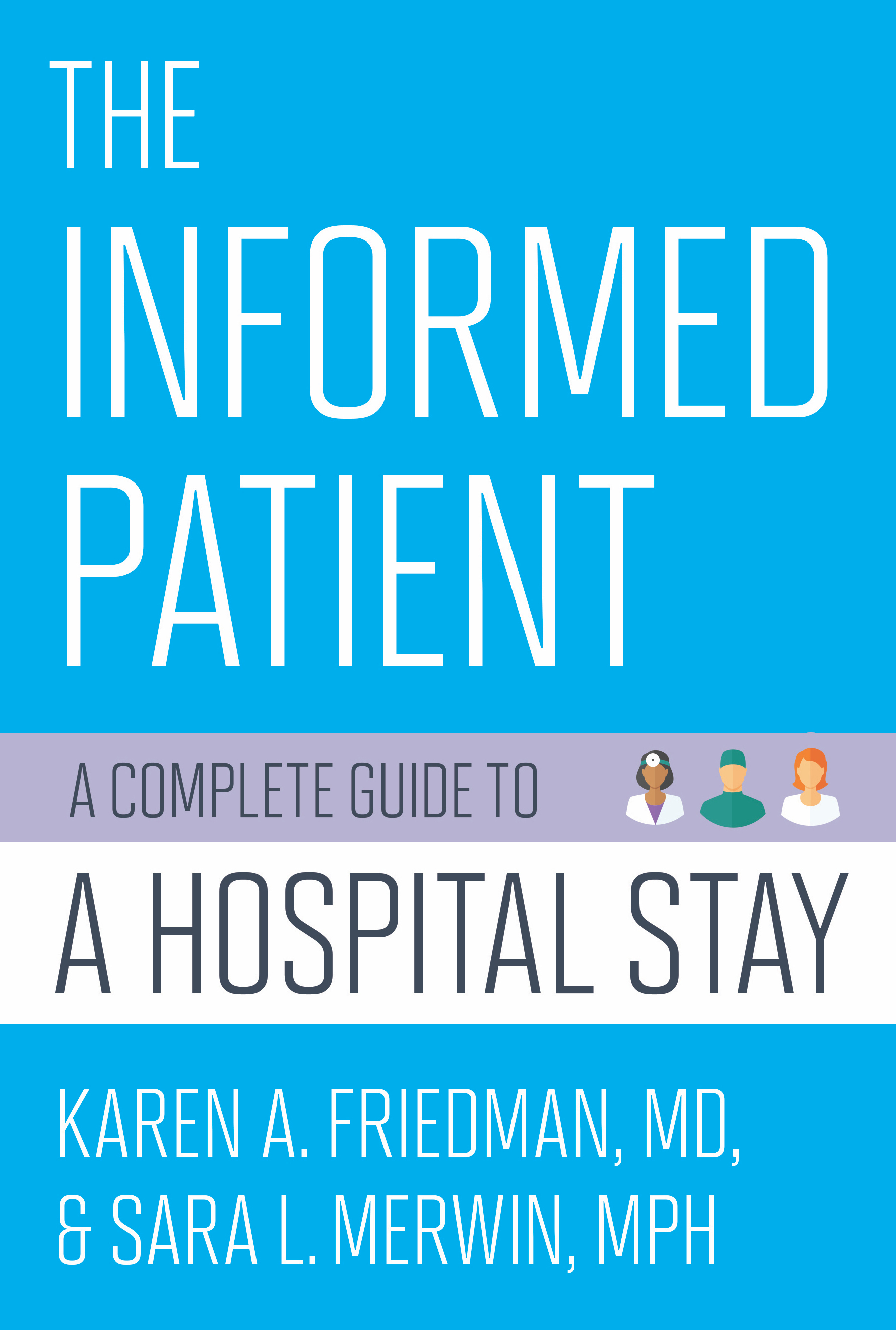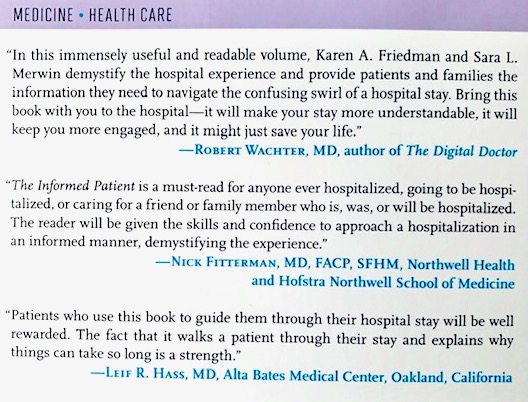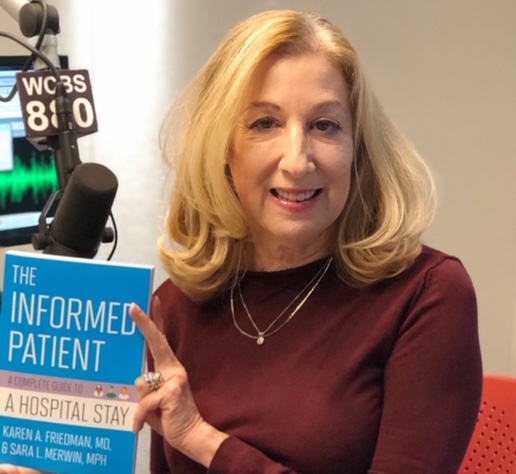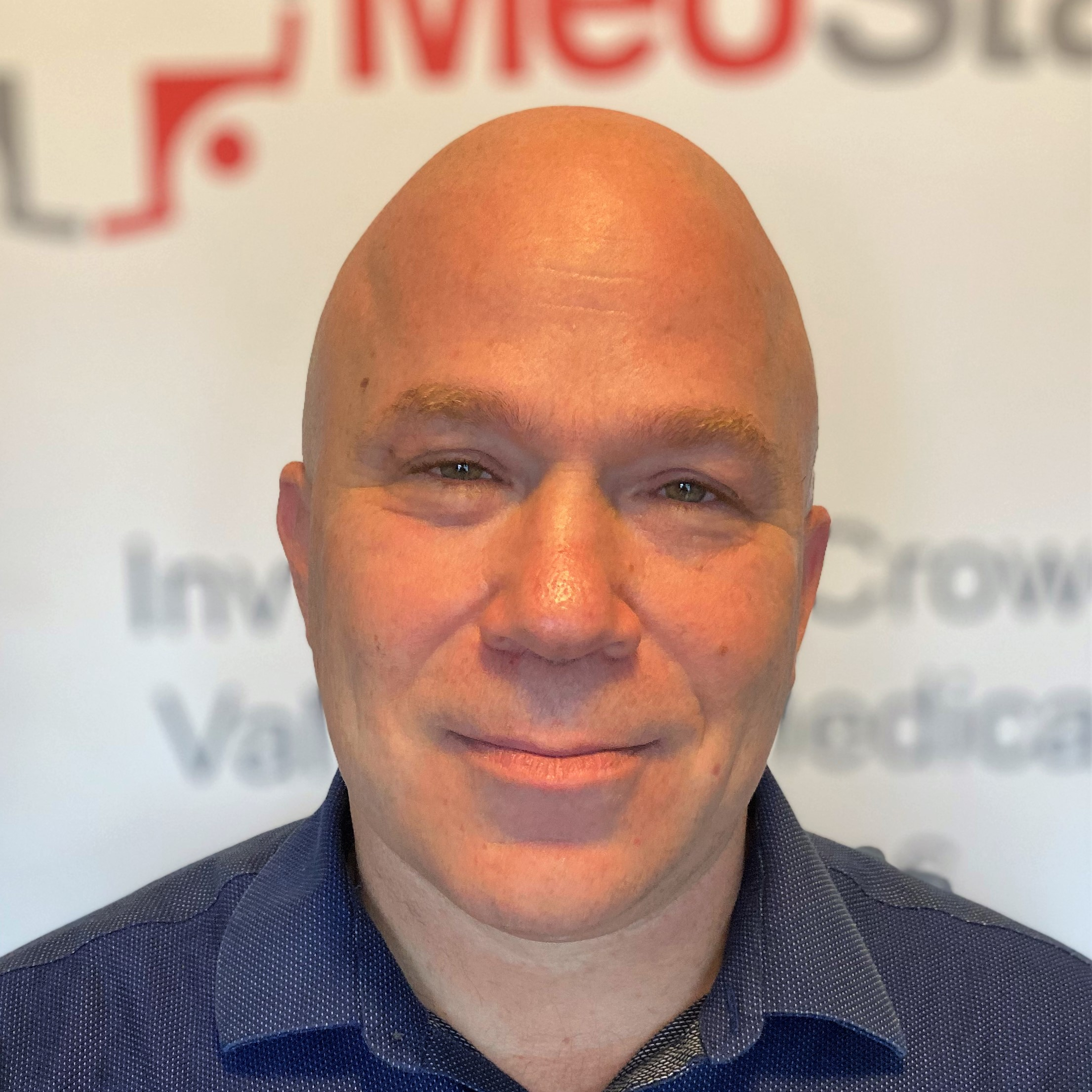Reduce Hospital Adverse Events: Helping Informed Patients Safely Navigate a Hospital Stay

The Informed Patient book educates patients and families to help them avoid medical errors while hospitalized. This campaign will fund marketing efforts to promote the book directly to hospitals.
Port Washington, NY United States Patient EducationAbout our project
The problem we solve: Today's hospital-based medicine is so complex, and time is so limited for health care providers, that medical errors and miscommunications are commonplace. As of 2017 it was estimated that between 210,000 and 400,000 patient deaths a year may be attributed to preventable medical errors in U.S. hospitals and emergency departments. From the patient's perspective, their hospital experience includes myriad personnel who often dress alike, a multitude of confusing tests and procedures, and impenetrable jargon. Unless they themselves also happen to be medical professionals, hospital patients do not have the education or technical knowledge to detect errors that can harm them. What's more, even the most capable of lay people are challenged in a hospital setting. Most patients, families and caregivers are unprepared to understand and manage the hospital encounter, especially when ill, injured, anxious and overwhelmed.

About our solution: "The Informed Patient” shares details about hospital personnel, procedures and policies that help patients understand and participate in their care, from the moment they enter (whether scheduled or through the ER) up through discharge. It is a hands-on, information-rich, yet easily understandable reference guide that addresses the myriad questions patients have whether they are admitted for illness, injury or planned surgery. An extensive chapter about the Emergency Department educates the 85% of ER patients who are not admitted. As hospital insiders, Dr. Friedman and Ms. Merwin provide specific tips and explanations to prevent errors, enhance safety, improve communication and optimize outcomes. A detailed glossary translates hospital jargon, Latin terms and acronyms into patient-friendly English. Suggested questions help patients and caregivers get the answers they need to share in decision-making and choosing wisely. "The Informed Patient" is available in paper and electronic forms.

Progress to date:
"The Informed Patient A Complete Guide to a Hospital Stay" book was published by Cornell University Press in 2017. The response by patients, physicians, nurses, and administrators has been overwhelmingly positive. "Everyone should have this book" is the quote we hear most often.
Dr. Robert Wachter, considered the father of Hospital Medicine, reviewed the book and stated, "...Bring this book with you to the hospital...it might just save your life."
Caregiver advocacy organizations have been particularly laudatory and supportive. Additionally, the response from the RN community—on the front lines for patient education and communication in the hosptal—has been extremely positive and there is interest in using the book as a teaching tool.
Dr. Friedman and Ms. Merwin actively support the content of the book and the furthering of the patient advocacy mission through radio and podcast appearances, live talks, blog posts and social media. In 2019, a marketing and public relationships strategist was engaged to create a website to support the authors' ongoing publicity efforts.
The objective of this fundraiser is to fund a direct marketing campaign targeting hospital patient advocacy executives and the foundations that support hospitals. The goal of the campaign is to encourage hospitals and foundations to purchase the book in bulk and provide the book to patients prior to planned admissions and make copies available in emergency departments.
About Our Team

Creator: Sara L. Merwin
Location: New York
Education: Columbia Mailman School of Public Health
Bio: Sara L. Merwin received an MPH in epidemiology from the Columbia University School of Public Health. Her career trajectory has been varied with immersion in many disciplines as a clinical and health services investigator, research skills teacher and patient educator. Most recently she was the Director of Clinical Research in the Department of Orthopaedic Surgery at the Montefiore Medical Center, Assistant Professor of Research in Orthopaedic Surgery and Associate in Medicine at the Albert Einstein College of Medicine. Formerly she was a research associate at the Northwell Health System where she was Assistant Professor in Orthopaedic Surgery and Internal Medicine at the Zucker School of Medicine at Hofstra University. Her investigations are across multiple medical specialties: orthopaedic and cardiothoracic surgery, internal medicine, endocrinology, geriatrics, critical care and pulmonary medicine with publications in pneumonia, venous thromboembolism prevention, delirium, hip fracture and osteoporosis. Ms. Merwin's career and research focus includes professional education and communication and patient activation. Her previous careers as an art director and pharmaceutical representative have expanded her skill set and world view, as have her post bac premedical studies. She presents nationally and internationally on research topics and quality improvement research.
Hospital Affiliation: previous: Montefiore Hospital/Einstein College of Medicine, Northwell/Zucker SOM
Title: Author, Speaker, Advocate
Advanced Degree(s): MPH epidemiology
About Team Members
Karen A. Friedman
Vice Chair for Education and Residency Program Director for the Zucker SOM , MD
Biography: Dr. Karen Friedman is the Vice Chair for Education and Residency Program Director for the Zucker SOM program in Internal Medicine at North Shore University Hospital and Long Island Jewish Hospital. She received her MD degree from SUNY Downstate and Her Masters in Health Professions Pedagogy and Leadership from Hofstra University. She has been on faculty in the Department of Medicine at North Shore Hospital as a Hospitalist since 2005 and is an Associate Professor of Medicine. Dr. Friedman’s career and research has been dedicated to medical education. She has published in and presents nationally on novel residency curricula and assessment methods in competency based medical education. She is the author of The Informed Patient- published in 2017 by Cornell University Press.
Title: Vice Chair for Education and Residency Program Director for the Zucker SOM
Advanced Degree(s): MD
Twitter:
@Karenfriedman9
Kathleen Hanover
Marketing and Public Relations Strategist, BFA
Biography: Kathleen Hanover is a marketing and public relations strategist whose superpower is spreading good news that improves peoples' lives. She is also a Go-Giver Certified Speaker and copywriting coach. Kathleen' extensive experience in the non-profit health sector was not enough to stop her own mother from being killed by negligence during a routine MRI, so Kathleen is passionate about getting The Informed Patient into the hands of every hospital patient in America.
Title: Marketing and Public Relations Strategist
Advanced Degree(s): BFA
LinkedIn:
www.facebook.com/strategicpersuasion
About Our Company
The Informed Patient A Complete Guide to a Hospital Stay
Location: 28 Pepperday Avenue
Port Washington, NY 11050
US
Founded: 2017
Website: http://www.informedpatientbook.com
Blog: http://www.informedpatientbook.com
Twitter: @saramerwin1 @karenfriedman9
Product Stage: In the Market
YTD Sales: Less than $250,000
Employees: 3-5
How We Help Patients
Our project is almost exclusively targeted for patients and caregivers. Our goal has always been to explain, describe and demystify everything about the hospital experience. In the book, we have chosen an inclusive approach with a welcoming writing style, accessible literacy level and many graphics and boxes to break up the text. We include little clinical vignettes to illustrate common scenarios that happen to patients. We also speak from our personal experience as patients and as caregivers of loved ones. We want our stories to resonate with our readers. To date, we have reached out to patients via radio, blogs and talks. We are constantly learning from patients and use their stories to keep us going further to make their hospital experience better and safer. It is our wish that people who have benefited by learning from the book will spread the word to others -- a grassroots movement! Many of the ideas expressed in the book and on the website blogs can be generalized to health care outside of the hospital as well. For example, we urge patients to ask their doctors many questions. We teach basic advocacy skills, and provide scripts to help communication with doctors and nurses. We teach patients how to prepare for a hospital stay, what to pack, what to expect and when it is of the utmost importance to speak up. We believe that knowledge is power and no more is this concept more relevant than in one's health care.
We have heard that many caregiver organizations recommend our book. We know that older adults are among the most vulnerable population going to the hospital and at the same time are the group most likely to be hospitalized. Therefore, many of our efforts, ongoing and future, are directed at older folks.
Dr. Friedman and Ms. Merwin came to this project to help people based on their observations that the hospital experience is frightening and confusing. When we advocate for our own loved ones, we walk in the shoes of you, the patient, as well. So we know firsthand how difficult it is to be a patient or to have a loved one in the hospital. Whether you have a chronic disease, planned surgery or just land up at the emergency department, we want to help you navigate, be less frightened and more safe.
How We Help Physicians
Physicians and other providers are overburdened, deluged in digital and paper work and scrambling to keep up with the latest medical information, evidence and novel therapeutics. We understand! Time is limited for patient encounters, not to mention interactions with family members and other members of the care team.
It is our belief that a patient who has an understanding of hospital processes, personnel, tests, procedures and therapies (and all the other details that comprise a hospital stay) will be more comfortable, less anxious and better focused to ask the pertinent questions and comply with orders. Dr. Friedman (a hospitalist and medical educator) and Ms. Merwin (an inpatient researcher and patient educator) have created the book for patients while simultaneously channeling the mindset and logistical constraints of the providers who take are of them. Some specific examples include: explanations for wait time in the ED and OR waiting room; the strong suggestion to write down questions BEFORE the physician comes into the room; the contemporary reality of the RN/MD relationship and scope of practice. Above all, patient safety is a concern for all stakeholders -- patients and caregivers who partner with the care team to protect patient safety can help prevent errors and complications and optimize outcomes. A major focus of the book is information offered to enhance safety; patients are enjoined to remain vigilant and adhere to hospital protocols with detailed explanations of why this is important and what harms can result if this advice is ignored.
How We Help Hospitals
Patient safety and patient satisfaction are the bywords of the contemporary health care era and medical marketplace. In this context, patient satisfaction is king. Hospitals stake their reputations and ultimately their profit margins on publicly reported data and patient reviews. Health systems rely upon favorable ratings to attract customers. And these customers (previously referred to as patients) dissect every nuance of the hospital encounter from the interactions with personnel to the quality of the food sent up by the dietary department. (It would not be an exaggeration to say that a subpar roast beef sandwich can downardly skew a rating.)
In the wake of the original Institute of Medicine's 1999 report "To Err is Human" and the ensuing and continuing media attention to medical errors and patient safety, there is particular focus by all sectors on reducing the morbidity and mortality resulting from mistakes. The hospital provides a rich resevoir in which errors may occur: a perfect storm of host factors, human error, and system failure conspires to yield potentially lethal outcomes. An informed, educated and engaged patient (or surrogate) can contribute to optimizing his or her own outcome. A patient who is prepared, knowledgable and less anxious will be more comfortable and satisfied. Providers and other hospital staff whose patients are less worried, mystified and overwhelmed will experience lower burden. Thus can hospital stakeholders garner value as benefits accrue to the patient, the provider and the hospital itself. Health systems and hospitals are poised to capitalize on the synergy generated by informing and educating patients by reducing the knowledge gap. "The Informed Patient: A Complete Guide to a Hospital Stay" book offers this simple solution. The distribution channels exist through the various departments and services patients pass through as they enter the hospital: triage, admitting, and pre-surgical testing. Supplying patients with this book is sure to reap benefits for all.
How We Help Partners
Similarly to the economic reality of health systems, pharmaceutical and device companies, imaging facilities and ambulatory care centers compete for customer business. Additionally, insurers, wellness programs, long-term care and subacute facilities, and senior residential communities are concerned with patient safety and comfort as it relates tp their bottom lines. All of these entities have a stake in optimizing outcomes for patients, whether it is reducing hospital admissions, preventing errors or improving satisfaction. Although the content in "The Informed Patient" book relates largely to individuals who will present to the emergency department or hospital, many of the principles outlined may be extrapolated to other care settings. Further, there are many overlapping intersections of health care services; for example, older adults are the largest consumer of medications, comprise the largest volume of nursing home residentsand by virtue of their health status, most likley to require the services rendered by the hospital. We would welcome a partnership with industry and entities that provide services to patients to further the mission of informing patients to enhance safety, prevent adverse events and optimize comfort.
Innovation Details
Intellectual Property Summary
The mission of the book and related projects is to reduce hospital adverse events and help prevent up to 410,000 hospital deaths annually. In addition, the book aims to enhance the patient experience, improve outcomes and patient satisfaction scores, and improve the interface between patients and their health care providers in the hospital. Cornell University Press holds certain publisher rights per the author contract. However, the content and message of the project are in the public domain.
Clinical Information
The Informed Patient book is based on well-validated concepts in medicine and hospital care. For example, there is a vast literature demonstrating that handwashing by hospital staff prevents the spread of infections (Pronovost et al N Engl J Med 2006; 355:2725-2732). Other "innovative" processes such as nursing relationship-based care may result in improving the quality of the provider and patient experience but remain in the early stages of evidence. Equally, as the physical plants of ICU are transformed to facilitate a more comforting and humane environment, it is hoped that positive data will emerge. For the present, the authors elect to describe the evolving hospital landscape and operational improvements. Moreover, the book and related projects rely on observations, common organizational structure and common-sense and pragmatic principles.
With respect to innovation, it would be interesting the test the hypothesis that an informed hospital patient has better outcomes than an "uninformed" patients but the limitations to such a study would be staggering: correlates of being informed such as socioeconomic status, the specific culture of the hospitals studied, individual responses to patient questions by members of the health care team, not to mention sufficient power, clearly defined improved outcomes and unbiased data collection to extract meaningful conclusions. For the present time, the authors rely upon anecdotal reports that the quality of the patient experience is enhanced by raising the comfort level with information and guidance.
Regulatory Status
The book and related projects are for educational processes exclusively; the authors make no recommendations for therapeutic interventions or medication administration. The project does not fall within the jurisdiction of the FDA.
How we will use the funds raised
Funds will be used to expand the distribution of the book by promoting bulk sales of the book directly to hospitals and hospital foundations via a direct marketing campaign. Prior engagement of a marketing and public relations expert has proved successful to establish a website for the project. We wish to re-engage the services of the marketing expert, who has extensive experience with the non-profit sector, B2B marketing and direct mail campaigns.
The estimated cost breakdown for a targeted B2B direct mail campaign to 500 contacts is:
- Bulk book purchases @ $10 each, $5,000
- Creative services (strategy, copywriting, and graphic design), $3,500
- Mailing supplies, $1,500
- Postage and printing, $3,000
- Mailing list research and rental, $1,000
- Administrative support, 40 hours @ $15 per hour, $600
- Miscellaneous $400
The campaign will be scaled up or down depending on funds raised, but the minimum viable budget is approximately $10,000.
This campaign is designed to raise funds through bulk sales, which will fund further marketing and public relations efforts. The hope is to raise enough for development of a media kit, and fund ongoing PR services including pitching the authors for media coverage opportunities as subject matter experts.
Thank You
Over and over we hear from patients recently discharged from the hospital that they wish they had "The Informed Patient: A Compete Guide to a Hospital Stay" book by their bedside during their hospital episode. Equally -- via reports, reviews, endorsements, social media and blogs -- physicians, nurses, allied health professionals and other stakeholders enthusiastically and unconditionally recommend the book.
We recognize that the message and content of the book has the potential to help a multitude of patients, families and health care providers and literally save lives. Yet, despite the stellar reviews and remarkable reception, the book cannot seem to climb over the precipice to wide dissemination.
In this time of heighened concern about health care, we know that many individuals are thinking about how to obtain a better experience.
It is our wish that the audience on MedStartr will widen our network to help us get the message out to patients, caregivers and providers. Secondarily and importantly, funding will enable our abiity to mount an aggressive marketing campaign to get the book in the hands of the hospital administrators specifically tasked with patient advocacy and satisfaction, in the sincere belief that they will recommend it to patients or (ideally) provide it to patients upon admission.
Updates
No updates found .
Supporters
-

07/03/2020 - Liked the project. , MS
, MS
06/01/2020 - Followed the project. Instant Feedback
Instant Feedback
Help us find best new ideas to fund by telling us what you think. Your feedback goes straight to the team behind this project in private, so tell them what you really think.
4Medstartr
Index Score4
Interest
Score0
Adoption
Score3
Likes0
Partners0
Pilots0
Follows-
This campaign has ended but you can still get involved.See options below.
$50 pledged of $15,000 goal
Instant Feedback
Help us find best new ideas to fund by telling us what you think. Your feedback goes straight to the team behind this project in private, so tell them what you really think.


